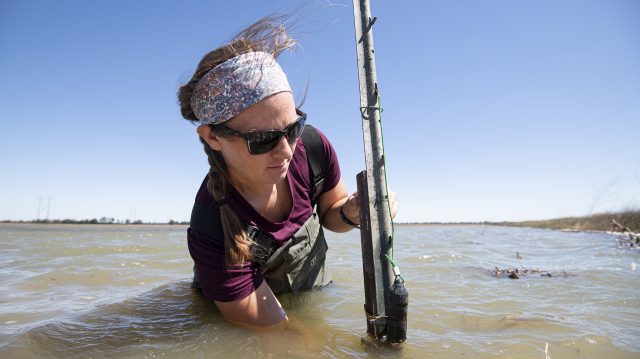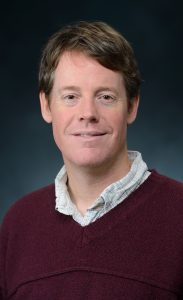
Victoria Simek, a technician for the Water Quality and Ecological Unit of the U.S. Department of Agriculture’s Agricultural Research Service, conducts water sampling in the Mississippi Delta for the Farmer to Farmer migratory shorebird project. UM biologist Jason Hoeksema will discuss the efforts as part of his Science Cafe presentation April 19 at Heartbreak Coffee in Oxford. Photo by Logan Kirkland/ Ole Miss Digital Imaging Services
OXFORD, Miss. – Conservation in the Mississippi Delta is the topic for a hybrid Oxford Science Cafe featuring a University of Mississippi biology professor who is studying ways to square the need for agricultural land with the benefits of maintaining wetland habitats.
The program will be held in person Tuesday (April 19) at Heartbreak Coffee, 265 North Lamar Ave., Suite G, and hosted on Zoom beginning at 6 p.m. Ole Miss biologist Jason Hoeksema plans to discuss “Science and conservation for birds and humans on working lands in the Mississippi Delta.”
“The Mississippi Delta was historically a vast wetland, covered with flooded woodlands, swamps and oxbow lakes,” Hoeksema said. “These wetland habitats provided essential ecosystem services, including flood control and wildlife habitat.
“Today, most of these wetlands have been drained or diverted for agriculture, which supplies food and represents a key economic base in our region.”
Questions to be addressed during Hoeksema’s 40-minute talk/webcast include whether we can conserve and restore the ecosystem services of wetlands while maintaining sustainable agricultural production.
“Delta Wind Birds is a conservation nonprofit based in Oxford, working to conserve existing wetlands and, especially, to create temporary wetlands on private lands in the Delta, including crop farms,” Hoeksema said. “Scientists from the University of Mississippi, the USDA-ARS and Mississippi State University are partnering with DWB to study how these temporary wetlands may benefit migratory water birds, conserve soil, reduce downstream nutrient pollution and improve crop yields.”
To view the program online, visit https://olemiss.zoom.us/j/99989536748. A link to the recorded talk will be posted afterward at https://www.phy.olemiss.edu/oxfordsciencecafe/.
For more information about the Oxford Science Cafe program, visit https://www.phy.olemiss.edu/oxfordsciencecafe/.
